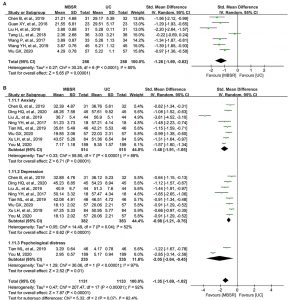Mindfulness Improves the Psychological Well-Being of Lung Cancer Patients
By John M. de Castro, Ph.D.
“You can be a victim of cancer, or a survivor of cancer. It’s a mindset.” — Dave Pelzer
Receiving a diagnosis of cancer has a huge impact on most people. Feelings of depression, anxiety, and fear are very common and are normal responses to this life-changing and potentially life-ending experience. But cancer diagnosis is not necessarily a death sentence. Over half of the people diagnosed with cancer are still alive 10 years later and this number is rapidly increasing. But surviving cancer carries with it a number of problems. Anxiety, depression, fatigue and insomnia are common symptoms in the aftermath of surviving breast cancer. These symptoms markedly reduce the quality of life of the patients.
Mindfulness training has been shown to help with general cancer recovery. Mindfulness practices have been shown to improve the residual symptoms in cancer survivors. Yoga is both an exercise and a mindfulness practice that has also been shown to be helpful with the residual symptoms in cancer survivors, the psychological and physical ability to deal with cancer treatment and improves sleep. The research findings have been accumulating. So, it makes sense to take a look at what has been learned.
In today’s Research News article “The Impact of Mindfulness-Based Stress Reduction (MBSR) on Psychological Outcomes and Quality of Life in Patients With Lung Cancer: A Meta-Analysis.” (See summary below or view the full text of the study at: https://www.frontiersin.org/articles/10.3389/fpsyg.2022.901247/full?utm_source=F-AAE&utm_medium=EMLF&utm_campaign=MRK_1896364_a0P58000000G0YfEAK_Psycho_20220705_arts_A&id_mc=312338674&utm_source=sfmc&utm_medium=email&utm_campaign=Article+Alerts+V4.1-Frontiers&utm_term=%%%3d++++++REDIRECTTO(+++++CONCAT(%27http%3a%2f%2fjournal.frontiersin.org%2farticle%2f%27%2c+TreatAsContent(field(%40article%2c+%27DOI__c%27))%2c+%27%2ffull%3futm_source%3dF-AAE%26utm_medium%3dEMLF%26utm_campaign%3dMRK_%27%2c+TreatAsContent(JobID)%2c+%27_%27%2c+TreatAsContent(%40FieldId)%2c+%27_%27%2c+TreatAsContent(Substring(Replace(Field(%40field%2c+%27Name%27)%2c+%27+%27%2c ) Tian and colleagues review, summarize, and perform a meta-analysis of the of the published research studies of the effectiveness of a mindfulness practice, Mindfulness-Based Stress Reduction (MBSR) on the psychological well-being of lung cancer survivors. MBSR consists of meditation, yoga, body scan, and group discussion.
They identified 17 published research studies that included a total of 1680 participants. They report that the published research found that the Mindfulness-Based Stress Reduction (MBSR) produced a significant reduction in cancer related fatigue, anxiety, depression, and psychological distress, and significantly increased mindfulness, self-efficacy, and sleep quality.
Hence, the research to date supports the use of mindfulness training to improve the psychological well-being of lung cancer survivors.
“Peace. It does not mean to be in a place where there is no noise, trouble or hard work. It means to be in the midst of those things and still be calm in your heart.” – Unknown
CMCS – Center for Mindfulness and Contemplative Studies
This and other Contemplative Studies posts are also available on Twitter @MindfulResearch
Study Summary
Tian X, Yi L-J, Liang C-S-S, Gu L, Peng C, Chen G-H and Jiménez-Herrera MF (2022) The Impact of Mindfulness-Based Stress Reduction (MBSR) on Psychological Outcomes and Quality of Life in Patients With Lung Cancer: A Meta-Analysis. Front. Psychol. 13:901247. doi: 10.3389/fpsyg.2022.901247
Objective: The impact of the mindfulness-based stress reduction (MBSR) program on psychological outcomes and quality of life (QoL) in lung cancer patients remains unclear. This meta-analysis aimed to evaluate the effectiveness of the MBSR program on psychological states and QoL in lung cancer patients.
Methods: Eligible studies published before November 2021 were systematically searched from PubMed, EMBASE, Cochrane Library, PsycINFO, China National Knowledge Infrastructure (CNKI), and Wanfang databases. The risk of bias in eligible studies was assessed using the Cochrane tool. Psychological variables and QoL were evaluated as outcomes. We used the Grading of Recommendations Assessment, Development and Evaluation (GRADE) system to grade the levels of evidence. Statistical analysis was conducted using RevMan 5.4 and STATA 14.0.
Results: A total of 17 studies involving 1,680 patients were included for meta-analysis eventually. MBSR program significantly relieved cancer-related fatigue (standard mean difference [SMD], −1.26; 95% confidence interval [CI], −1.69 to −0.82; moderate evidence) and negative psychological states (SMD, −1.35; 95% CI, −1.69 to −1.02; low evidence), enhanced positive psychological states (SMD, 0.91; 95% CI, 0.56–1.27; moderate evidence), and improved quality of sleep (MD, −2.79; 95% CI, −3.03 to −2.56; high evidence). Evidence on MBSR programs’ overall treatment effect for QoL revealed a trend toward statistical significance (p = 0.06, low evidence).
Conclusion: Based on our findings, the MBSR program shows positive effects on psychological states in lung cancer patients. This approach should be recommended as a part of the rehabilitation program for lung cancer patients.
